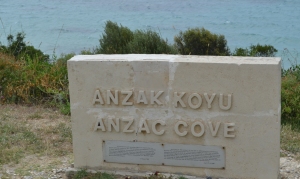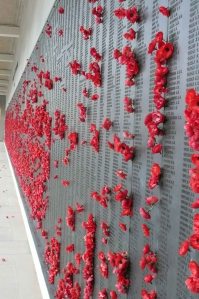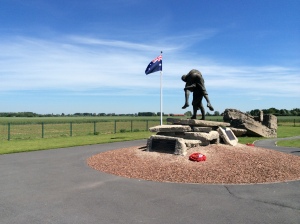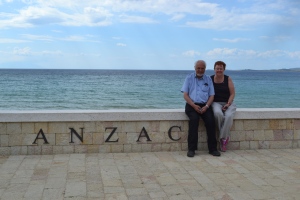 Today’s Remembrance Day is particularly poignant as we honour the fallen from all our wars, but especially from World War I. The intensity of re
Today’s Remembrance Day is particularly poignant as we honour the fallen from all our wars, but especially from World War I. The intensity of re membrance over the next four years may almost become overwhelming. It is impossible to imagine the reality of the horrors and terrors those men suffered through the long months and years of the war.
membrance over the next four years may almost become overwhelming. It is impossible to imagine the reality of the horrors and terrors those men suffered through the long months and years of the war.
Each year at ceremonies around the country we are reminded “they do not grow old as we who are left grow old”. We honour and recognise the sacrifice that was made by these men who gave their lives far young or old, single or married, bushies or city slickers.
The men who died overseas have contributed to our sense of ourselves as a nation, a people who could be relied on when in a tight corner, who would fight to the bitter end. Where did their courage come from when they could be told “Boys you have ten minutes to live and I am going to lead you”[i].
What passing bells for these who die as cattle?
Only the monstrous anger of the guns.
Only the stuttering rifles’ rapid rattle.[ii]

However there’s another aspect which I think we have sometimes neglected as family historians and one which will challenge us even more than documenting the history of our family members who died in action.
To what extent do we consider the lives of those left behind? The impact of loss on families, friends and communities? How is that documented in the official record? And how did they respond to never knowing exactly where their loved one was buried, let alone understand why there might no keepsake to treasure for themselves or their children?
I haven’t received nothing belonging to him. I don’t even know of his burial place.[iii]
And what of the men who returned, some horrifically injured physically and no longer able to continue in their former occupations? It seems almost impossible that any man who returned, or indeed the nurses who cared for them, would return the same person mentally or emotionally. What of the guilt they may have carried at the loss of close family, brothers or friends?
What do we know of how this affected their family life? Each returning soldier’s emotional responses to his wife and children? The general view is that they kept the horrors locked down inside them until each Anzac Day or Remembrance Day but surely the trauma must have seeped out from time to time. How did the women cope with the return of husbands, fathers, sons, brothers or sweethearts who were no longer the same men they had farewelled? At least those who married after the war would have had some idea of what they were “buying into”. Perhaps the men felt slightly more reconciled since they knew they’d gone to war voluntarily and were not conscripted like almost all the other nations.

Bill Gammage’s book The Broken Years is increasingly difficult to find but is a useful starting point for our research into the returned soldier’s attitudes at the time.
These returned soldiers are the men who helped to build our then-new nation despite the traumas they’d experienced. They grew old but had to fight on in daily life. They deserve our attention as much as those who were lost and it seems to me that there is a great deal still ahead for us to research.
Lest We Forget…those who died, those they left behind and those who lived to rebuild…in all the nations of the war.
My earlier posts on Remembrance Day are:
2013: Erle Victor Weiss
2012: Lest we forget: the Battle of Milne Bay
2011: Honouring the Australian born diggers with German ancestry.
Anzac Day:
2014: Two brothers go to war and Postcards to the Front
2013: V is for our Valiant Indigenous ANZACs
2012: V is for the Valiant of Villers-Brettoneux (my most-read post)
2011: Lest we forget: William Rudolph (Robert) Kunkel (MIA Korea)
Battle of Fromelles: In Memoriam James Augustus Gavin
[i] Lt Col Alexander White, Commander of the 8th Light Horse at the charge of The Nek, Gallipoli
[ii] Wilfred Owen’s Anthem for Doomed Youth from the War Poetry Website.
[iii] Elizabeth Maud Paterson writing to the Army on 1 September 1921 about James Thomas Paterson of the 49th Battalion who died 5 April 1917. His body was never recovered and his name is among those on the memorial at Villers-Brettoneux.

It is a question I have often pondered… I saw my big strong grandfather, who never spoke about the war, break down and cry when we took him to the Australian War Memorial for the first time. He was intrigued by the dioramas of France, showing us where he had been, yet it wasn’t until he passed, that we discovered he had won, not one, but two Military Medals for bravery… we didn’t know about either.
Then post Vietnam War, we witnessed the total change in one of my brother’s friends when this softly spoken, gentle young man, became so aggressive and so short tempered that he could no longer bear company… so many stories of wounded, of broken marriages, of deserted families… so many broken lives…
LikeLike
How very sad about your grandfather, and what amazing courage he had to win two MMs. What a special, and therapeutic, experience you gave him. My immediate family has largely been protected from these traumas having been in protected industries.
Such hidden tragedy, and sometimes not so hidden. Someone said to me recently “war is terrible for young men” or something to that effect.
LikeLike
Love the images you have chosen for this post Pauleen. The most poignant are those where an injured comrade is being carried to safety. Indeed war destroyed the lives of more than those who were killed . We so often hear of elder,y women whose sweethearts were killed and who never married, such was their sense of loss. And who can ever forget the images in the song And the band played Waltzing Matilda. I have just finished researching an Irishman who fought with ANZAC forces and who spent the rest of his life in a mental hospital. (Post to come!)When you read the eyewitness accounts of what was endured you would wonder how any of those who were in the thick of it ever managed to lead any sort of a normal life afterwards. I am sure their experiences haunted them for the rest of their lives and that is bound to impact on families. Very thoughtful post. Thank you! A
LikeLike
I doubt we’ll ever truly know the impact of the war though you’ve alluded to a number of them. Look forward to hearing the story of the Irish ANZAC. Pauleen
LikeLiked by 1 person